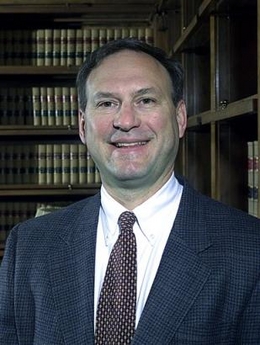|
Bush to nominate Alito to Supreme Court
(AP)
Updated: 2005-10-31 20:29
President Bush, stung by the rejection of his first
choice, will nominate Samuel Alito to the Supreme Court, selecting a
conservative federal judge to replace retiring Justice Sandra Day O'Connor, a
moderate.

This undated photo provided by the U.S. Court
of Appeals for the 3rd Circuit shows Judge Samuel A. Alito of the U.S.
Court of Appeals in Philadelphia. President Bush is nominating Samuel
Alito to the Supreme Court, The Associated Press has learned, choosing a
long-time federal judge embraced by judicial conservatives to replace
retiring Justice Sandra Day O'Connor. [AP] |
The choice, confirmed by two senior Republican official, was likely to spark
a political brawl. Unlike the nomination of Harriet Miers, which was derailed by
Bush's conservative allies, Alito will face opposition from liberal Democrats.
Bush planned to announce the nomination at 8 a.m. EST.
The White House hopes the choice mends a rift in the Republican Party caused
by his failed nomination of Miers, and puts his embattled presidency on a path
to political recovery. Democrats already put the White House on notice that a
conservative judge such as Alito would create problems.
So consistently conservative, Alito has been dubbed "Scalito" or
"Scalia-lite" by some lawyers because his judicial philosophy invites
comparisons to conservative Supreme Court Justice Antonin Scalia. But while
Scalia is outspoken and is known to badger lawyers, Alito is polite, reserved
and even-tempered.
Miers bowed out last Thursday after three weeks of bruising criticism from
members of Bush's own party who argued that the Texas lawyer and loyal Bush
confidant had thin credentials on constitutional law and no proven record as a
judicial conservative.
The officials, speaking on condition of anonymity because they were not
authorized to preview Bush's remarks, said Alito was virtually certain to get
the nod from the moment Miers backed out. The 55-year-old jurist was Bush's
favorite choice of the judges in the last set of deliberations but he settled
instead on someone outside what he calls the "judicial monastery," the officials
said.
Bush believes that Alito has not only the right experience and conservative
ideology for the job, but he also has a temperament suited to building consensus
on the court. A former prosecutor, Alito has experience off the bench that
factored into Bush's thinking, the officials said.
"Judge Alito has a strong judicial track record," said Republican consultant
Greg Mueller who works closely with conservative activists. "He has more
experience than many who have come to the court."
While Alito is expected to win praise from Bush's allies on the right,
Democrats have served notice that his nomination would spark a partisan brawl.
Senate Minority Leader Harry Reid, D-Nevada, said Sunday that Alito's nomination
would "create a lot of problems."
Unlike Miers, who has never been a judge, Alito, a jurist from New Jersey,
has been a strong conservative voice on the 3rd U.S. Circuit Court of Appeals
since Bush's father, former President George H.W. Bush, seated him there in
1990.
With the embarrassing withdrawal of the Miers nomination last week, the
rising death toll in Iraq and Friday's indictment of top vice presidential aide
I. Lewis "Scooter" Libby, Bush's approval ratings are at the lowest ebb of his
presidency. Polls show Democrats and most independents don't approve of his job
performance, leaving the conservative wing of his party the only thing keeping
Bush afloat politically.
Judicial conservatives praise Alito's 15 years on the Philadelphia-based
court, a tenure that gives him more appellate experience than almost any
previous Supreme Court nominee. They say his record shows a commitment to a
strict interpretation of the Constitution, ensuring that the separation of
powers and checks and balances are respected and enforced. They also contend
that Alito has been a powerful voice for the First Amendment's guarantees of
free speech and the free exercise of religion.
Liberal groups, on the other hand, note Alito's moniker and say his
nomination raises troubling concerns, especially when it comes to his record on
civil rights and reproductive rights. Alito is a frequent dissenter on the 3rd
Circuit, one of the most liberal federal appellate benches in the nation.
In the early 1990s, Alito was the lone dissenter in Planned Parenthood v.
Casey, a case in which the 3rd Circuit struck down a Pennsylvania law that
included a provision requiring women seeking abortions to notify their spouses.
"The Pennsylvania legislature could have rationally believed that some
married women are initially inclined to obtain an abortion without their
husbands' knowledge because of perceived problems — such as economic
constraints, future plans or the husbands' previously expressed opposition —
that may be obviated by discussion prior to the abortion," Alito wrote.
The case ended up at the Supreme Court where the justices, in a 6-3 decision
struck down the spousal notification provision of the law. The late Chief
Justice William H. Rehnquist cited Alito's reasoning in his own dissent.
Alito, an Italian-American who grew up in Trenton, N.J., has a resume filled
with stepping stones to the high court. He was educated at Princeton University
and earned a law degree from Yale University, the president's alma mater.
The nomination of Alito could end the intense speculation over who would
replace O'Connor, a decisive swing vote in a host of affirmative action,
abortion, campaign finance, discrimination and death penalty cases.
Bush first picked John Roberts to replace O'Connor, but when Chief Justice
William H. Rehnquist died, the president quickly re-nominated Roberts to the top
chair on the high court.
After the Senate confirmed Roberts 78-22, Bush nominated Miers to replace
O'Connor. She withdrew within a month.
|